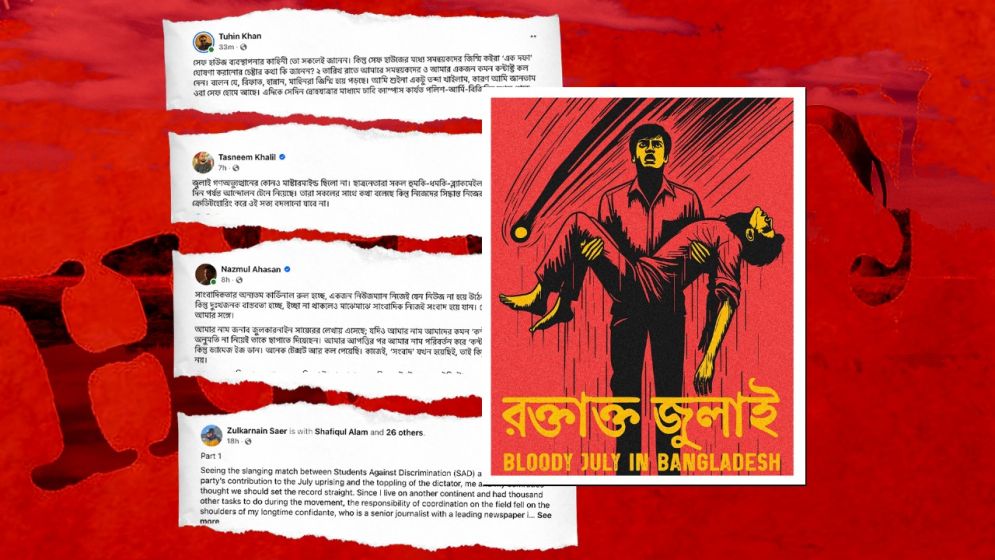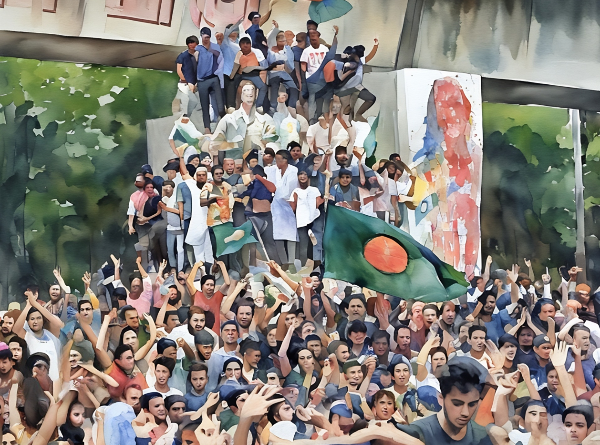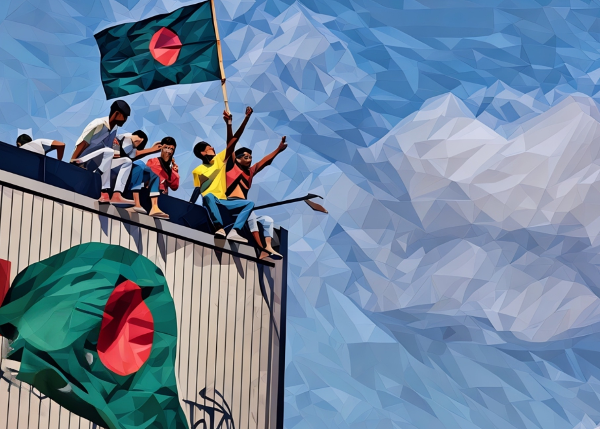Bangladesh's Facebook space and the battle over the Long July Uprising's legacy

Since Friday, Bangladesh's Facebook space has been in turmoil,
ignited by a handful of prominent journalists and activists sharing their personal accounts
of the tumultuous July-August uprising.
The events of those days were fast-moving and chaotic, making it
difficult to piece together a coherent timeline.
Much like the fable of the blind men describing the elephant by
only touching parts of it, many of those involved in the uprising—activists and
supporters alike—have been sharing their stories to make sense of the larger
whole.
But while anecdotes and oral histories can be valuable tools for
understanding, constructing a historical narrative requires expertise.
This is a job best left to professional historians, who can
stitch together fragmented pieces to offer a complete picture grounded in their
methodical, scholarly approach.
In Bangladesh, however, these personal Facebook posts—no matter
how invaluable they may be—have been interpreted by a significant portion of
the population as attempts to claim credit for orchestrating the uprising from
behind the scenes.
And so, once again, I feel compelled to repeat something I've
said from the very beginning:
Anyone—except the martyrs—who seeks to claim credit for this
movement must be understood as standing against the very spirit of it.
Allow me to highlight a few key points, which I ask you to
consider carefully:
The very essence of this movement is plural. There was no
singular mastermind pulling the strings.
Every step of the way, there were moments of uncertainty, and
each time, someone rose to overcome it and push forward.
Even after the announcement at the DB office suspending the
movement, it continued to gain momentum. There were countless risky moments
like this.
What made this movement so powerful was its unity across diverse
groups—students, ordinary citizens, religious figures, and women—regardless of
political party or ideology.
If we lose that pluralism, the movement will lose its essence.
It will cease to embody the spirit of collective action and will transform into
something reactionary—akin to a mere extension of Mujib-ism.
As philosopher Hegel might argue, that would amount to a "crime against the spirit" of the movement—one that is unforgivable.

The need for unity and
preserving the spirit
In this moment, we must preserve the spirit of the uprising,
which transcended individual agendas.
It was never about claiming personal victory. It was always
about the collective.
The uprising essentially marked the historical emergence of a
new generation’s authority, a seismic shift in the political landscape.
The downfall of dictator Hasina was not the cause, but rather a
byproduct of this widespread movement.
There was no calculated power agenda behind it. What happened
instead was a clear message from Gen Z, who have passed their verdict against
the kind of politics they refuse to accept.
Moving beyond the entrenched, partisan structures of the past,
the only way to honor this movement now is by establishing a state rooted in
civil rights.
If we fail to do this, any further discussion will only
accelerate the chaos.
From a philosophical lens, we can think of this moment as an
example of Being and Event.
When an event transcends its original cause or reason, it
becomes something greater—it evolves into a historical event.
This transformation happens when the event develops an
autonomous, self-sustaining essence.
It’s no longer defined by the expectations or logic of its
origin, but instead by its own momentum and significance.
Through this lens, the events of 24th July represent a pure "event." The possibility of becoming something larger than its parts exists as long as we can preserve the autonomous spirit of the movement—its ability to transcend all attempts at personification or narrow claims.

The debate for “credit”
should end
We must recognize that human nature is inherently greedy.
We desire control over everything, and our lives often become
consumed by our egos. The desire for immortality—a longing to leave an
indelible mark on history—is a form of this same greed.
In the pursuit of this, people often engage in questionable
actions: writing poetry when they’re not poets, creating philosophy without
depth, or pretending to be a saint when they are not.
Even those who have not truly lived through history will try to
present themselves as central figures.
Yet, time does not favor such pretensions.
The real essence of historical events lies not in the
individuals who play a prominent role, but in the collective spirit that shapes
them.
To preserve that spirit, we must avoid the personification of
the movement. It is not about any one individual or their claim to the
uprising’s success.
Once we shift focus from the spirit of the collective to
individual egos, we risk diluting its true meaning.
If we fail to protect this essence, we will not have understood what the uprising was truly about. And if we fail to honor it, we may lose the very core of what made it so significant.
—
Rezaul Karim Rony is a
writer and thinker. He is the editor of Joban magazine

